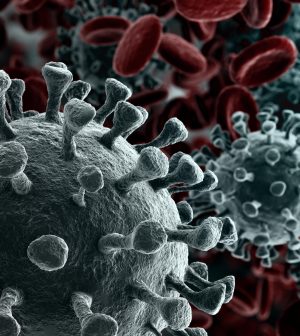- Could Your Grocery Store Meat Be Causing Recurring UTIs?
- Are You Making This Expensive Thermostat Error This Winter?
- Recognizing the Signs of Hypothyroidism
- 10 Strategies to Overcome Insomnia
- Could Artificial Sweeteners Be Aging the Brain Faster?
- Techniques for Soothing Your Nervous System
- Does the Water in Your House Smell Funny? Here’s Why
- Can a Daily Dose of Apple Cider Vinegar Actually Aid Weight Loss?
- 6 Health Beverages That Can Actually Spike Your Blood Sugar
- Treatment Options for Social Anxiety Disorder
How Many Days Do COVID Antibodies Stick Around?

Adults who get COVID-19 could have antibodies circulating in their blood for nearly 500 days after infection, new research suggests.
“We now have a good estimate of how long antibodies last after a COVID-19 infection,” said study author Michael Swartz, an associate professor and vice chair of biostatistics at the University of Texas Health Science Center at Houston. “Our research shows that the level of antibodies in those previously infected increases for the first 100 days post-infection and then gradually declines over the next 500 days and beyond.”
For the new study, Swartz and his team analyzed data from more than 57,000 volunteers older than 20 enrolled in the Texas CARES survey. It was launched in October 2020 to track COVID-19 antibody status over time.
Most of the volunteers self-reported a COVID-19 infection before October 2020. The researchers examined blood samples collected from participants between Oct. 1, 2020, and Sept. 17, 2021.
While individual results varied based on age, weight, smoking or vaping, and severity of infection, all of the volunteers had a similar decrease in antibodies, according to the report published recently in The Journal of Infectious Diseases.
Even though antibodies can last for nearly 1.5 years after COVID-19 infection, Swartz emphasized that vaccination provides the best protection against infection, reinfection and hospitalization.
“We know that the rates of reinfection or hospitalization after being vaccinated are a lot lower than not being vaccinated, especially against other variants like we saw with Delta and Omicron,” he said in a university news release. “So, if you haven’t been vaccinated, now is the time to do it.”
Previous research from Texas CARES showed that children had circulating antibodies for at least seven months after a COVID-19 infection.
More information
For more about COVID-19 antibodies, visit the U.S. Centers for Disease Control and Prevention.
SOURCE: University of Texas Health Science Center at Houston, news release, May 31, 2022
Source: HealthDay
Copyright © 2026 HealthDay. All rights reserved.










